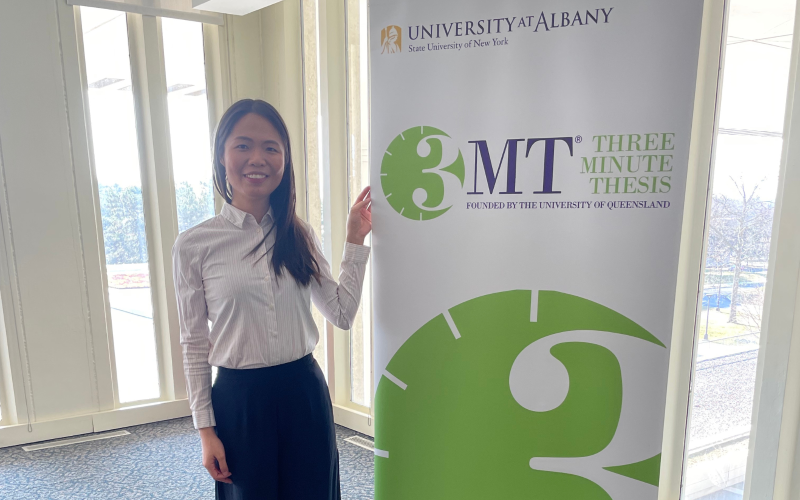DrPH Student Places Second in UAlbany's Three-Minute Thesis Competition

ALBANY, N.Y. (April 7, 2024) — DrPH student Charlotte Huang recently placed second in the sixth annual UAlbany Three-Minute Thesis (3MT) competition, which requires master’s and doctoral students to present their research to an audience of non-experts in only three minutes.
The original 3MT competition was developed in 2008 by the University of Queensland, Australia, and has since been adopted by over 900 institutions across 85 countries. The idea emerged during a severe drought that prompted public officials to encourage citizens to time their showers to just three minutes to save water. Alan Lawson, who at the time was Dean of Graduate Studies, felt that a three-minute challenge would be an excellent way to help graduate students practice their presentation and communication skills.
We sat down with Huang to talk about her research and what it was like to boil down an entire doctoral dissertation into a three-minute presentation.
Your dissertation, which you presented at 3MT, is titled “Simulating a multi-tier intervention for refugee mental health using agent-based modeling.” How did you end up writing about this topic?
"I began by exploring my interest in refugee mental health interventions. I discussed my ideas and possible dissertation plans with several professors, and it turned out that Melissa Tracy’s research aligns well with my interests. I met Dr. Tracy when I took her Psychiatric Epidemiology course in my second year. Her expertise in public health, mental health, and specifically the use of agent-based modeling has provided me with very important guidance as my dissertation research progresses.
We agreed that primary data collection with a refugee population might not be feasible given my timeframe, so she suggested that using a mathematical simulation model like agent-based modeling would be a way to address this problem while also exploring a new use of this strategy in the mental health field. I recently passed my dissertation proposal defense, and now I am in the early stages of research. I am very excited to learn more about the programming language Python for constructing agent-based models."
What made you decide to enter the 3MT competition?
"I think it’s an important skill to be able to present scientific research to a lay audience in a very precise manner, and 3MT provided a great opportunity for me to challenge myself. I also entered because of the cash prizes ($1,000 for first place). I plan to attend a summer workshop on computational social science for my dissertation, and the money will help fund my trip."
What are your career goals?
"My goal is to become a public health leader who brings changes to public health and healthcare systems via innovative approaches such as biostatistics programs and simulation models. To be more specific, I see myself working with an interdisciplinary team in consulting, research, or government agencies to create and implement policies and interventions to improve population mental health and quality of care."
Any advice for other graduate students who might be considering taking part in next year’s competition?
"First, I would say go for it! Even if you are at the early stages of your dissertation research like I am, you should consider participating. 3MT is a great opportunity for you to challenge yourself and present your work. You will also learn a lot from watching other participants give their presentations.
My strategy was to think of it as a storytelling competition. I decided to use a video game analogy as the main idea to explain the concept of my methodology so that I would not have to get into too many of the technical details. I wrote a script, practiced a lot, collected feedback from my friends, and revised my script for improvement. The hardest part was to skip all of the types of details that doctoral students think are very important but ultimately are not accessible to the audience."


